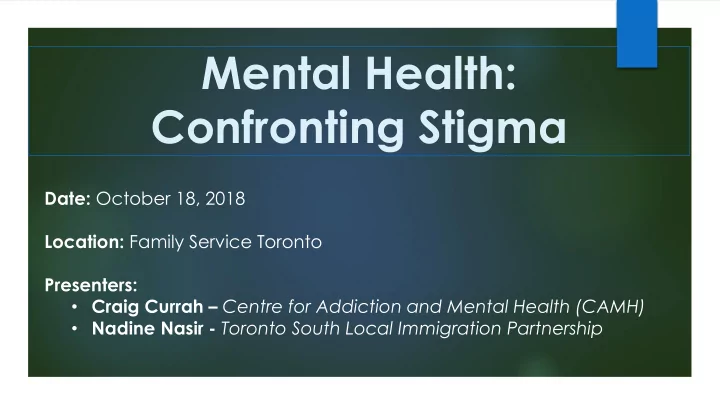

Mental Health: Confronting Stigma Date: October 18, 2018 Location: Family Service Toronto Presenters: • Craig Currah – Centre for Addiction and Mental Health (CAMH) • Nadine Nasir - Toronto South Local Immigration Partnership
Why Focus on Stigma? “Stigma is not just about hurting someone’s feelings. Stigma is about prejudice, discrimination and the violation of a person’s human rights.” (CAMH)
Agenda 1. Exploring the Consequences of Stigma 2. Understanding Mental Health & Mental Illness Expressions of Mental Health • Focusing on Recovery • 3. Language & Communication 4. Tips
Exercise Please listen to the question. Respond to the question by standing beside the number that is closest to your response. 1 = YES 2 = Probably 3 = Probably not 4 = NO
What is Stigma? Stigma groups people together through unfair assumptions and beliefs, leading to negative attitudes and discrimination. Labelling Devaluing Discrimination Stereotyping “The single most important barrier to overcome in the community is the stigma and associated discrimination towards people suffering from mental and behavioural disorders.” - World Health Organization
When Stigma is Internalized S Health care T Support I Help Medicine from family G & friends M Counselling A
When Stigma is Internalized (CAMH)
The Consequences of Stigma Unable to SUFFERING complete activities of daily living Social isolation Impaired Loss of confidence functioning Don’t Lack of self-actualization receive Don’t treatment seek Unable to fulfill role as caregiver/careprovider? help Job loss?
Social Determinants of Health Our Health – and it’s potential to develop - is impacted by these factors
What is “Mental Health”? HEALTH
Mental Health & Mental Illness
What is “Mental Illness”? “ A biological condition of the brain that causes alterations in thinking, mood, behaviours (or some combination thereof) associated with significant distress and impaired functioning ” (WHO, 2014)
Expressions of Mental Illness 4 • Understandings and Be mindful of: expressions of mental • Different comfort levels illness (including with our health care symptoms) depend system on many factors, including culture. • Not favouring western concepts of health • Try not to assume & Value many forms of healing generalize (i.e. there (i.e. sweat lodge) are differences within cultures)
Expressions of Mental Illness Have knowledge/skills to work within • • Be open to being educated client’s culture by asking them about it • Remember that western concepts • Understand the meaning the client of health are not necessarily the gives to the trauma from their cultural “right” way. There’s no “one size fits perspective all” approach to mental health. • Understand what healing means • See the person as a unique within the cultural context individual, and have a conversation to better understand what their • Understand how your own cultural norm is. For example: “You background can influence mentioned that you’re sleeping a interactions with client lot more than usual. How does that feel for you ?” Instead of: “You’re sleeping too much.”
What Does Recovery Look Like?
Language & Communication A person is a person, not an illness • Example: Schizophrenic vs. a person that has schizophrenia Language to avoid • Overuse of mental health language • “Commit” Suicide Inclusive language Acknowledge, Thank, Validate
How to Talk About Seeking Support Client decides what they want and when. Remember to follow their lead. • Offering something is not forcing • Provide choice • Partner with the person Self- • Let them decide what to do determination • Don’t judge!
How to Talk About Seeking Support How can • Be concrete – what have you noticed? I help? What do • Talk about changes you’ve seen you need in this • Focus on experiences/feelings rather than phrasing things moment? as symptoms or labels What will help you • Help to determine how it’s disrupting the life they want to cope or be more lead , how it’s getting in the way calm? • Examine choices and consequences together • Ask, find out more
Tips Be Authentic • Take the person seriously • Be Person-Focused • Trauma informed Care – • Universal Precautions Speak up, Speak out • Family Centered Care Make space for • • owning and telling our Patient/Client led decision- own stories in our own • making words Peer-to-Peer Programs Be mindful of power • • imbalance
7 Ways to Reduce Stigma CAMH 1. Know the facts. Educate yourself about mental illness including substance use disorders. 2. Be aware of your attitudes and behaviour. Examine your own judgmental thinking. 3. Choose your words carefully. The way we speak can affect the attitudes of others. 4. Educate others . Pass on facts and positive attitudes; challenge myths and stereotypes. 5. Focus on the positive . Mental illness, including addictions, are only part of anyone's larger picture. 6. Support people . Treat everyone with dignity and respect; offer support and encouragement. 7. Include everyone . It's against the law to deny jobs or services to anyone with these health issues.
Resources 1. Addressing Stigma (CAMH) https://www.camh.ca/en/driving-change/addressing-stigma 2. Tutorial (CAMH) http://www.camhx.ca/education/online_courses_webinars/mha101/stigma/Stigma_.ht m 4. Jack Project https://jack.org/Resources/Mental-Health-101 Support 1. Across Boundaries – 51 Clarkson Ave, Toronto, 416 787 3007 http://www.acrossboundaries.ca/ 2. Hong Fook, Various Locations in GTAhttp://hongfook.ca/
Recommend
More recommend